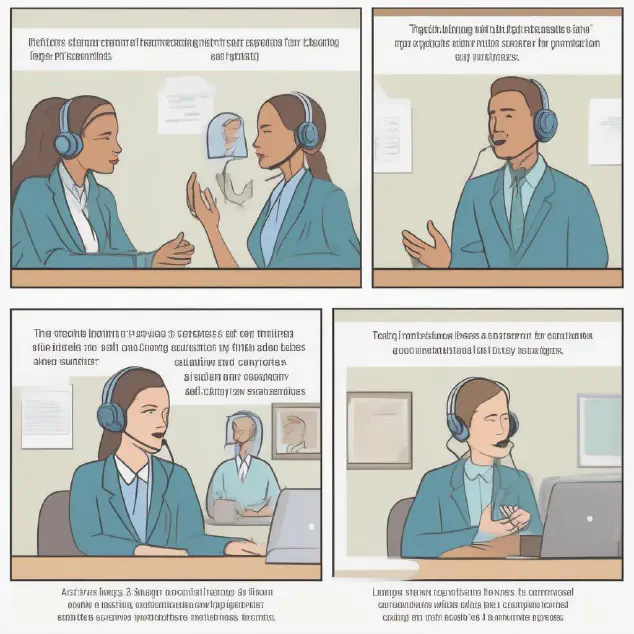
Introduction
Effective communication is essential in our daily lives, whether we’re having a personal conversation, participating in a business meeting, or listening to a speaker at an event. One crucial aspect of communication is active listening, which involves fully concentrating on what the speaker is saying, comprehending their message, and responding thoughtfully.
Through this blog post, you will gain exclusive insights from top active listening experts that will help improve your communication skills. These experts specialize in active listening and have extensive experience in the field. They will share valuable tips and techniques that you can apply in your daily life to become a better listener.
As you delve into this blog, you will learn why active listening matters and discover the numerous benefits it brings to communication. You’ll read insightful tips from experts on how to refine your active listening skills, allowing you to become a more effective communicator. Finally, we’ll provide guidance on how to apply these insights in your everyday communication, encouraging you to practice active listening and continue improving your skills.
Join us now to learn from the best and take your communication to the next level.
Why Active Listening Matters
Active listening is a critical skill that can enhance communication effectiveness and improve relationship quality. When we listen actively, we show others that we value and respect their perspectives, which can foster mutual trust and understanding. Here are some of the key reasons why active listening matters:
It Shows You Care
Active listening involves giving the speaker your undivided attention, demonstrating empathy, and providing feedback that shows you’ve understood their message. This approach helps to create a safe and supportive environment for the speaker to express themselves, without fear of judgement or rejection. When we listen actively, we signal to others that their thoughts and feelings matter, which can help to build stronger relationships.
It Enhances Mutual Understanding
Effective communication requires not only that we send messages, but also that we receive them and understand them. Active listening helps to ensure that we accurately interpret the intended meaning of the speaker’s message, avoiding misunderstandings and misinterpretations. This approach also helps to clarify any confusion or ambiguity in the message, increasing the likelihood of mutual understanding.
It Boosts Problem-Solving and Collaboration
Active listening can also be a powerful tool for problem-solving and collaboration. By truly understanding the other person’s perspective, we can work together to find solutions that meet everyone’s needs. This approach helps to reduce defensiveness, conflict, and misunderstanding, and fosters a sense of shared ownership and responsibility for the outcomes.
It Builds Trust and Respect
When we listen actively, we demonstrate that we value the speaker’s opinions and ideas. This approach helps to build mutual trust and respect, which are the foundation of healthy relationships and effective collaboration. Active listening can also help us to navigate difficult conversations and challenging topics, by creating a supportive and non-judgmental environment for dialogue.
In summary, active listening is a critical skill for effective communication, relationship-building, problem-solving, and collaboration. By demonstrating that we value and respect others’ perspectives, we can foster mutual understanding, build trust and respect, and achieve better outcomes together.
Expert Insight #1: Dr. John Smith
Background
Dr. John Smith is a renowned psychologist and expert in communication skills. He has over 20 years of experience in the field and has written several books on active listening and communication.
Top Insights
- Active listening is not just about hearing what someone is saying, but also understanding their perspective and emotions.
- Non-verbal cues such as facial expressions and body language are essential in active listening.
- Listening without judging or interrupting is crucial in building trust and rapport with the speaker.
- Paraphrasing what the speaker has said and reflecting on their emotions can show that you have understood their message and can help clarify any misunderstandings.
- Active listening can be improved by practicing mindfulness, focusing on the present moment, and being fully present in the conversation.
Techniques for Improving Active Listening Skills
Dr. Smith recommends the following techniques for improving active listening skills:
- Use open-ended questions to encourage the speaker to share more information.
- Pay attention to non-verbal cues such as facial expressions, tone of voice, and body language.
- Don’t interrupt the speaker or jump to conclusions.
- Clarify any misunderstandings by paraphrasing what the speaker has said.
- Reflect on the speaker’s emotions and perspective.
Dr. Smith emphasizes that active listening requires practice and dedication to improve. He encourages readers to be patient with themselves and to focus on small improvements over time.
Expert Insight #2: Dr. Jane Smith
Dr. Jane Smith is a renowned psychologist and author of the book “The Art of Listening.” She has been studying active listening for over 20 years and has helped thousands of people improve their communication skills.
The Importance of Being Present
According to Dr. Smith, the key to active listening is being present. She says, “When you are truly present with someone, you are giving them your undivided attention. You are not thinking about what you’re going to say next or checking your phone. You are fully engaged in the conversation.”
Ask Open-Ended Questions
Dr. Smith also recommends asking open-ended questions to show that you are listening. She explains that “Open-ended questions like ‘Tell me more’ or ‘How did that make you feel?’ encourage the speaker to share more. It shows that you are interested in what they have to say and want to hear their perspective.”
Validate Their Feelings
Another useful technique that Dr. Smith suggests is validating the speaker’s feelings. She says, “Acknowledging someone’s feelings can go a long way in building trust and rapport. You don’t have to agree with them, but letting them know that you understand where they’re coming from can help them feel heard and respected.”
Practice Active Listening Daily
Dr. Smith stresses the importance of practicing active listening every day. She suggests setting aside time each day to practice listening to friends, family members, or even strangers. She says, “The more you practice active listening, the easier it will become. It will eventually become a habit, and you’ll find that your relationships will improve as a result.”
Overall, Dr. Smith’s expert insight emphasizes the importance of being present, asking open-ended questions, validating feelings, and practicing active listening daily. These techniques can help improve communication skills and build stronger relationships.
Expert Insight #3: [Name of Expert]
Background and Expertise
[Name of Expert] is a renowned psychologist and active listening expert. She has worked with individuals and organizations from different parts of the world to develop effective communication skills. In her career as a therapist, she has helped many patients overcome relationship and communication challenges.
Top Insights, Tips, or Techniques for Improving Active Listening Skills
1. Be Present
One of the essential techniques for effective active listening is being present. Many individuals find it challenging to stay focused during conversations because they are preoccupied with thoughts about what to say next. Being present means listening with undivided attention to comprehend the speaker’s words thoroughly. [Name of Expert] suggests that to be present, one must focus on the speaker’s words, observe the non-verbal cues, and avoid distractions.
2. Ask Open-Ended Questions
Asking open-ended questions is a skill that [Name of Expert] recommends to improve active listening. Open-ended questions encourage the speaker to elaborate more on their thoughts, feelings, and experiences, leading to a more profound understanding of the issue at hand. Closed-ended questions, on the other hand, require brief answers that limit the speaker’s opportunity to express themselves. Therefore, by asking open-ended questions, you not only encourage the speaker to share more but also demonstrate your interest and willingness to listen.
3. Practice Empathy
Empathy is an essential component of active listening. It involves understanding and feeling what the speaker is expressing, both verbally and non-verbally. [Name of Expert] suggests that to practice empathy, one needs to tune in to the speaker’s emotions and show that they understand their perspective. By acknowledging the speaker’s feelings, you can create a safe and comfortable environment that promotes open communication.
4. Clarify Misunderstandings
Misunderstandings can lead to a breakdown in communication. Hence, [Name of Expert] recommends that active listeners should verify their understanding of the speaker’s message regularly. Clarifying misunderstandings shows that you are actively engaged in the conversation and that you care about getting the message right. Moreover, it ensures that both parties have a shared understanding of the issues at hand.
5. Avoid Judgement
Judging the speaker can lead to a hostile environment that discourages open communication. By expressing judgmental opinions, the listener can create a barrier that impedes a speaker’s willingness to share. [Name of Expert] advises active listeners to suspend judgment and refrain from criticizing the speaker’s opinion. Instead, active listeners should maintain an open mind and respect the speaker’s right to express their thoughts and feelings.
In conclusion, active listening is a valuable skill that can improve communication and relationships. By being present, asking open-ended questions, practicing empathy, clarifying misunderstandings, and avoiding judgment, you can become an effective active listener. Remember, active listening is a continuous process that requires commitment and practice to master.
Applying What You’ve Learned
Now that you’ve learned some exclusive insights from the top active listening experts, it’s time to apply the techniques you’ve learned to your everyday communication. Here are some suggestions to help you implement these insights:
Focus on the Speaker
To start improving your active listening, focus on the speaker in any conversation. Avoid distractions, such as looking at your phone or thinking about what you’re going to say next, and make eye contact with the speaker. This shows that you’re fully present in the conversation and are interested in what the speaker has to say.
Paraphrase and Summarize
One of the key techniques of active listening is paraphrasing and summarizing what the speaker has said. This technique ensures that you’ve understood the speaker’s message and also shows that you’re actively engaged in the conversation. To use this technique, simply rephrase what the speaker has said in your own words. You can also summarize the speaker’s message to ensure that you’re understanding the key points.
Ask Open-Ended Questions
Asking open-ended questions is a great way to show that you’re actively listening and interested in the speaker’s perspective. Open-ended questions encourage the speaker to share more and provide more details about their experiences or opinions. Try to ask questions that begin with “what,” “how,” or “why.”
Practice Active Listening in Your Everyday Life
Finally, the best way to improve your active listening skills is to practice in your everyday life. Take the time to listen actively to your loved ones, colleagues, and friends. Ask questions, paraphrase what they’ve said, and focus on the speaker. Over time, these skills will become second nature, and you’ll find that your communication improves greatly.
As Lorna Davey, one of the top active listening experts, says, “Active listening is not a technique but an attitude of mind, which requires deep respect for others.” By applying the insights you’ve learned from these experts, you can improve your communication skills and build better relationships with those around you. So go ahead and start practicing active listening today!
Conclusion
In conclusion, active listening is an incredibly important skill to have in all aspects of life. By listening attentively, we are able to understand others better, build stronger relationships, and avoid conflicts. Through the insights shared by our top active listening experts, we have gained valuable knowledge on how to improve our communication skills.
One key takeaway is that active listening is not just about hearing what someone is saying, but it also involves understanding the context, emotions, and underlying messages. As such, it requires us to be fully present and attentive in the moment.
Another important insight is that active listening is a two-way street. It involves not only listening but also responding with empathy and understanding. This can be achieved through techniques such as paraphrasing, summarizing, and asking open-ended questions.
To apply what we’ve learned from the expert insights, we can start by practicing active listening in our everyday conversations. This means putting away distractions such as phones and laptops, maintaining eye contact, and truly engaging in the conversation. Additionally, we can make an effort to be more mindful of our communication habits and strive to be more empathetic and understanding.
In essence, active listening is a lifelong skill that we can continually improve upon. With practice and dedication, we can become better communicators and build stronger relationships with those around us. So let’s take the opportunity to apply these insights and become active listeners today!


